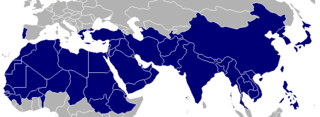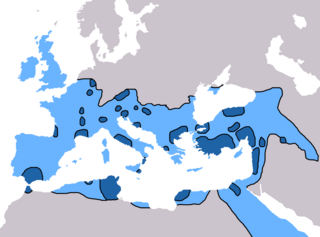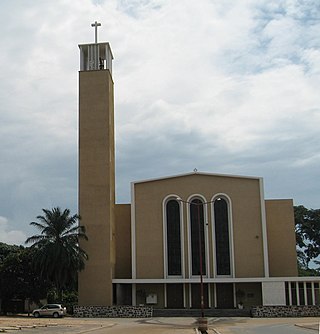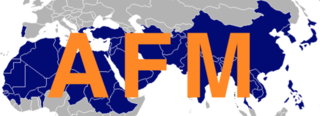Related Research Articles

In Christianity, evangelism or witnessing is the act of preaching the gospel with the intention of sharing the message and teachings of Jesus Christ.
Proselytism is the policy of attempting to convert people's religious or political beliefs. Carrying out attempts to instill beliefs can be called proselytization.
A Christian mission is an organized effort for the propagation of the Christian faith. Missions involve sending individuals and groups across boundaries, most commonly geographical boundaries, to carry on evangelism or other activities, such as educational or hospital work. Sometimes individuals are sent and are called missionaries, and historically may have been based in mission stations. When groups are sent, they are often called mission teams and they do mission trips. There are a few different kinds of mission trips: short-term, long-term, relational and those that simply help people in need. Some people choose to dedicate their whole lives to mission. Missionaries preach the Christian faith, and provide humanitarian aid. Christian doctrines permit the provision of aid without requiring religious conversion. However, Christian missionaries are implicated in the genocide of indigenous peoples. Around 100,000 native people in California, U.S., or 1/3 of the native population, are said to have died due to missions.

The 10/40 Window is a term coined by Christian missionary strategist and Partners International CEO Luis Bush in 1990 to refer to those regions of the eastern hemisphere, plus the European and African part of the western hemisphere, located between 10 and 40 degrees north of the equator, a general area that was purported to have the highest level of socioeconomic challenges and least access to the Christian message and Christian resources on the planet.
Protestants in Myanmar make up 5% of that nation's population in 2023. Most Christians are from the minority ethnic groups such as Karen, Lisu, Kachin, Chin, and Lahu. An estimated 0.1% of the Bamar population is Christian.
The U.S. Center for World Mission, later known as the Venture Center, was a collaborative Christian mission base in Pasadena, California from 1976 until 2019. The center sought to connect other like-minded organizations around prayer, research, innovation, media, education, strategy, and mobilization with a continued focus on unreached people groups.
Religion in Montenegro refers to adherents, communities, institutions and organizations of various religions in Montenegro. While Eastern Orthodox Christianity is the dominant religious denomination in Montenegro, there are also sizable numbers of adherents of both Catholic Christianity and Islam.
As of 2011, most Armenians in Armenia are Christians (97%) and are members of the Armenian Apostolic Church, which is one of the oldest Christian churches. It was founded in the 1st century AD, and in 301 AD became the first branch of Christianity to become a state religion.

Ralph Dana Winter was an American missiologist and Presbyterian missionary who helped pioneer Theological Education by Extension, raised the debate about the role of the church and mission structures and became well known as the advocate for pioneer outreach among unreached people groups. He was the founder of the U.S. Center for World Mission, William Carey International University, and the International Society for Frontier Missiology.

Christianity is, according to the 2011 census, the fifth most practiced religion in Nepal, with 375,699 adherents, or 1.4% of the population. Many informed observers have estimated that there are at least 1 million Nepali Christians. According to some Christian groups, there may be as many as 3 million Christians in Nepal, constituting up to 10% of the country's population. A report by Gordon Conwell Theological Seminary identified the Nepali church the fastest growing in the world. The vast majority of Nepali Christians are evangelical Protestants ; there is also a small Catholic population of roughly 10,000.
Gawlamten is a village in Chipwi Township in Myitkyina District in the Kachin State of north-eastern Burma. The village is predominantly inhabited by the Kachin people, an ethnic minority group in Myanmar.

Multiculturalism and Christianity have a long historical association. Christianity originated as a sect of Judaism in the Middle East, as Jesus, the founder and central figure of Christianity, lived and held his ministry in the Middle East. Paul the Apostle, an ethnic Jew who was born and lived in the Middle East, holds such importance to Christianity that some call him the religion's "Second Founder". The greatest influence on Christianity after Paul, Augustine of Hippo, a Church Father, a Doctor of the Church, and an eminent theologian, was North African. Under the influence of Paul, Christianity soon spread widely among non-Jews (Gentiles) of the Roman Empire.
The Lausanne Committee for World Evangelization, more commonly known as the Lausanne Movement, is a global movement that mobilizes Christian leaders to collaborate for world evangelization. The movement's fourfold vision is to see 'the gospel for every person, disciple-making churches for every people and place, Christ-like leaders for every church and sector, and kingdom impact in every sphere of society'.
In religious studies and folkloristics, folk religion, popular religion, traditional religion or vernacular religion comprises various forms and expressions of religion that are distinct from the official doctrines and practices of organized religion. The precise definition of folk religion varies among scholars. Sometimes also termed popular belief, it consists of ethnic or regional religious customs under the umbrella of a religion, but outside official doctrine and practices.
Christianity in the 20th century was characterized by an accelerating secularization of Western society, which had begun in the 19th century, and by the spread of Christianity to non-Western regions of the world.

Religion in Burundi is diverse, with Christianity being the dominant faith. Catholicism is the largest Christian denomination in the country.

Anglican Frontier Missions is an American-based Christian mission organization that "To plant biblically-based, indigenous churches where the church is not, among the 2 billion people and 6,000+ unreached people groups still waiting to hear the Gospel for the very first time."
Christianity and colonialism are often closely associated with each other due to the service of Christianity, in its various sects, as the state religion of the historical European colonial powers, in which Christians likewise made up the majority. Through a variety of methods, Christian missionaries acted as the "religious arms" of the imperialist powers of Europe. According to Edward E. Andrews, Associate Professor of Providence College Christian missionaries were initially portrayed as "visible saints, exemplars of ideal piety in a sea of persistent savagery". However, by the time the colonial era drew to a close in the later half of the 20th century, missionaries were viewed as "ideological shock troops for colonial invasion whose zealotry blinded them", colonialism's "agent, scribe and moral alibi".
In Christianity, an unreached people group refers to an ethnic group without an indigenous, self-propagating Christian church movement. Any ethnic or ethnolinguistic nation without enough Christians to evangelize the rest of the nation is an "unreached people group". It is a missiological term used by Evangelical Protestants. The Lausanne Committee for World Evangelization defines a people group as "the largest group within which the gospel can spread as a church planting movement without encountering barriers of understanding or acceptance." "Nation" is sometimes used interchangeably for "people group". The term is sometimes applied to ethnic groups in which less than 2% of the population is Evangelical Protestant Christian, Including nations where other forms of Christianity are prevalent such as Western Catholicism, Eastern Christianity or Lutheranism.

Hinduism is a minority religion in Andorra, where Christian forms the majority. It's also the third largest religion in the country, after Christianity and Islam. In 2015, there were 390 (0.5%) Hindus in Andorra. Majority of Hindus in the country are immigrants from India, who had mainly come for jobs and business purpose.
References
Notes
- ↑ "What is a People Group? | Joshua Project". joshuaproject.net. Retrieved 2022-07-20.
- ↑ Shellnutt, Kate (22 April 2019). "Missions Experts Are Redefining 'Unreached People Groups'". ChristianityToday.com. Retrieved 2021-03-11.
- ↑ "Beyond Project".
- ↑ "Joshua Project | Joshua Project". joshuaproject.net. Retrieved 2021-03-11.
- 1 2 "Frontier Ventures". www.frontierventures.org.
- ↑ Joshua Project. "Great Commission Statistics". Joshua Project. Retrieved 2010-03-11.
- ↑ "peoplegroups.org, Joshua Project" (PDF).
- ↑ Scribner, Dan. "Joshua Project: Bringing Definition to the Great Commission". Mission Frontiers.
Bibliography
- Johnstone, Patrick; Hanna, John; and Smith, Marti (1996) Praying Through the Window III: The Unreached Peoples . YWAM Publishing. ISBN 978-0-927545-98-3.
- Stump, Roger W. (2008) The Geography of Religion: Faith, Place, and s]Space, Rowman & Littlefield. ISBN 978-0-7425-1080-7, 381f.
- Thomas, Pradip Ninan (2008) Strong Religion, Zealous Media: Christian Fundamentalism and Communication in India SAGE Publications Ltd. pp.142-145. ISBN 978-81-7829-834-4